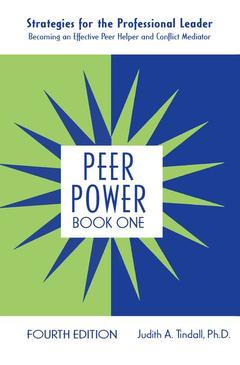Description
Peer Power, Book One (4th Ed.)
Strategies for the Professional Leader: Becoming an Effective Peer Helper and Conflict Mediator
Author: Tindall Judith A.
Language: English
Subject for Peer Power, Book One:
Keywords
effective; helper; exercises; group; work; training; procedure; koosh; balls; flip; Exercises Group Work; Peer Power; Effective Peer Helper; Koosh Balls; Module VI; Peer Helper; Flip Chart Paper; Minutes Group Work; Module IX; Peer Program; Playback; Complete Exercise; Ow Sheet; Follow; Genuine Message; Exercise Sheets; Ict Mediator; Nonattending Behavior; Training Session Time; Training Procedures; Confrontation Skill; Integrating Communication Skills; Human Potential Group; Trainees Study; Trainee’s Plan
Publication date: 07-2016
· 15.2x22.9 cm · Hardback
Publication date: 01-2009
· 15.2x22.9 cm · Paperback
Description
/li>Contents
/li>Readership
/li>Biography
/li>
The Peer PowerProgram is a peer training program designed for middle, high school, and higher education students, focusing on 8 core skills: Attending, Empathizing, Summarizing, Questioning, Genuineness, Assertiveness, Confrontation, and Problem Solving. Through a series of exercises, games, and self-awareness techniques, youth and adults involved in the program can gain the basic communication and mediation skills necessary to effectively help their peers.
The professional strategies book provides the program leader/facilitator with clear and easy to follow guidelines for implementing the Peer Power Program. After an overview of the peer program philosophy, training structure, and goals, the leader's guide proceeds through the thirteen Modules that are found in the student Workbook. For each exercise in the student Workbook, this leader's guide provides instructions for introducing and implementing the exercise, time and material requirements, description of its purpose and goal, and application assignments. Equipped with the professional strategies book, the program leader (teacher, school counselor, juvenile center officer, mental health professional and human resource professional) can quickly and confidently work through the Peer Power curriculum.
Introduction. Unit A: Setting the Stage. Module 1: What is Peer Helping. Module 2: Understanding Yourself and Others. Module 3: Let's Look at Helping. Module 4: Communication Stoppers. Unit B: Developing Skills. Module 5: Attending Skill. Module 6: Empathy Skill. Module 7: Summarizing Skill. Module 8: Questioning Skill. Module 9: Genuineness Skill. Module 10: Assertiveness Skill. Module 11: Confrontation Skill. Module 12: Problem-solving Skill. Unit C: Implementing a Program. Module 13: Strategy Development. Strategy Development 1: Putting Peer Helping into Action. Strategy Development 2: Ethical Considerations in Peer Counseling/Peer Helping. Strategy Development 3: What Next? NAPP Programmatic Standards and Ethics.




